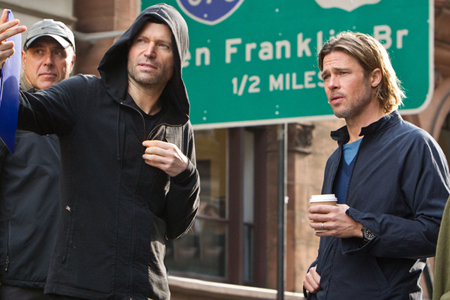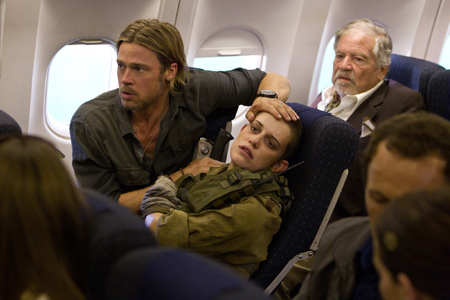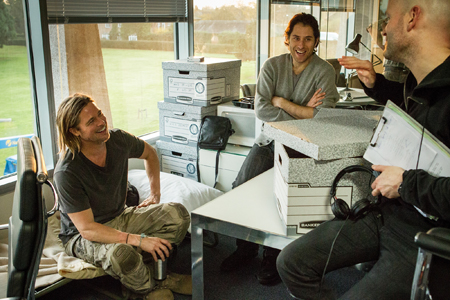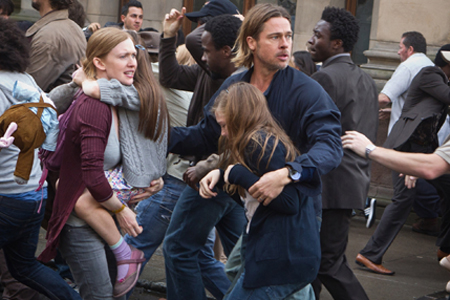WORLD WAR Z Director Marc Forster Q&A: 'I Believed in the Movie'
- Details
- Category: Interviews
- Created: Wednesday, 19 June 2013 12:23
- Published: Wednesday, 19 June 2013 12:23
- Written by Lupe Haas

WORLD WAR Z director Marc Forster and producer/star Brad Pitt have traveled around the globe promoting the zombie apocalypse movie opening June 21st and now Marc Forster makes a stop with CineMovie for a Q&A.
In our fifteen-minute interview with the director of WORLD WAR Z, Marc Forster (Quantum of Solace, Finding Neverland) opens up about the challenges in adapting the novel, working with Brad Pitt as the star and producer of the film, and why he chose to highlight the intensity of the story rather than the blood and guts. He also touches on the inaccurate press reports surrounding the troubled production that affected him negatively.CM: Are you excited to have the movie come out?
Forster: Yes (laughs) very excited!
CM: Now you've taken the movie all over the globe, how has the reaction been so far?
Forster: The reactions have been mostly positive. I would say between 80-85/90% positive. I was just really amazed how a lot of people embraced the movie.
CM: Yeah I saw it with the crowd on Friday and they were pretty excited about it, throughout the movie and at the end. You also took it to Germany, how was it returning home and premiering the movie there?
Forster: That went exceptionally well. Germany went great. France went great. It just came back from Korea and Australia and that went really great. Yeah it was a really wonderful reception.
CM: When you first signed on for the project and started talking about it, obviously there is a lot of talk about how zombies are the new “it monsters” right now. How did you go about it or what was the discussion about what was going to be different for another movie about the apocalypse and zombies?
Forster: Well for me I didn't just want to create a zombie movie. So it was interesting to create, like you just mentioned, the apocalypse and the end of the world and having zombies be a part of it, because they are such great symbols and metaphors that first became very popular in the 70's. I felt like the movie can work on several levels; on a pure fun, blockbuster kind of level and then on a second tier always because the metaphor stands for a socio-political backdrop which is nice to have. Even though it's a just a backdrop and everybody can use interpretation however they want to and that's the fun part of it because everyone thinks something different.
CM: Now when some people, mostly younger people, go into a zombie movie they want gore but in this one I enjoyed that it was more of a detective story. Less gore and more on the thrills. Was that always the intention or what was the discussion about how much gore there would be?
Forster: No, personally I wanted to make it a movie that is acceptable for everyone and not to make it PG13 or R. Basically I wanted to focus on intensity and not gore because gore can sometimes in movies like this, be theatrics. Intensity is much more interesting and harder to create. For me it was the idea to create this very real world, and make it as close to reality as possible and have people because of that, on the edge of their seats throughout the entire movie.
CM: Well I think you did a really good job and that's what surprised me about the film, that it was very suspenseful.
Forster: Oh thank you!
CM: Speaking of thrills, the scene in the airplane was terrifying! How was it shooting that scene? Was it one of the harder scenes to shoot on that production?
Forster: Actually the airplane scene wasn't as hard because you're on a stage and you're in a confined space and you have a confined amount of people in a tent. Because you're not weather dependent and on a stage, everything is pretty much controllable. You're in this confined space and you feel claustrophobic and that it's terrifying and that makes its much harder to shoot these huge epic sequences like Philadelphia or Israel because in those sequences, you're dealing with thousands of extras, weather conditions, multiple cameras, helicopters and so on and so forth. It's much harder because there are endless kinds of variables you have to control.
CM: Speaking of weather conditions I was talking to James Badge Dale yesterday and he said the London night shoots were pretty hard because you're dealing with fake rain, and then you're dealing with real rain.
Forster: Yeah we had the rain machines but then I think there was some real rain on top of it (laughs). You know the more real anything looks, and the weather gets the better and that's what the whole thing is about. When I first read the novels they felt very real and I felt like I wanted to create this world that felt really real and that we could basically step out of the theatre and think “this could happen right now, right here.”
CM: Are night shoots difficult, more so than daytime?
Forster: Yeah it's just hard. You play with night shoots when you start, usually you're warm and cozy and if you are you're like “oh this is not so bad,” but when it hits like 4 in the morning and the temperatures go a few degrees colder, and it's still raining and you're soaked, and you feel like “you know what I really wish I could lay in bed right now.”
CM: Now can you talk about Brad, both as an actor and also as a producer on the film?
Forster: Yeah on one hand, as an actor on set he focuses on his role and his acting. It's very focused and the exchange between myself and him is very actor-like and it's really fluid, simple, straight to the point and very professional. And then once you wrap, he puts the producer hat on and he differentiates those roles very much and then he's a producer. The good thing about having someone like him as a producer is that he obviously wants everything to go on screen, and wants to make the movie as good as possible and look as good as possible and everything else. That's a really big plus because he himself is the star of it as well.
CM: Right, and I think that's the best part of the movie is that he's so relatable and is a family man so it makes him even more realistic I think.
Forster: Yeah that's one of the things I really like too. On the one hand it's a very intimate family story that everyone can relate to. He's in every man's person and in every man's character, a guy that everybody can relate to and then ultimately he becomes this reluctant hero. It's a family story juxtaposed to this sort of epic, action, end of the world kind of scenario, which I thought would work very well.
CM: Now he said that he wanted to make this film for his two boys who are fans of the zombie genre. Were they around a lot or on set?
Forster: Yeah when he works his family always travels with him and they come on and off of the set as well.
CM: It's an interesting story around Muse and how they were reading the book while they were writing their album, and you happened to stumble upon the song. Are you a fan of Muse?
Forster: Yes, I like the music and I thought the song that was playing would work so well. Then we kept them playing and we all said we need to get them involved, so I'm glad that they were game to do it.
CM: Now on casting Daniella Kertesz as Segan, I thought she was great and it was great that a female Israeli soldier was protecting Jerry. How did you find her?
Forster: You know I went to Tel-Aviv on my trip down to Israel and was auditioning people obviously for her role and other minor roles and just for the whole Israel part, seeing all of the actors and actresses. Then she wasn't available at the time that I was in Tel-Aviv, I sort of left back to London, and suddenly I got this tape sent that said, “Hey Marc there's this other actress. She just came out of nowhere and you should have a look at it.” So I watched the tape and I said, “Oh my god she's so good, I need to see her!” Then I was flying to Malta, and she came in to meet me in Malta for a little audition. She auditioned there for me and I thought, “She's so good!” I taped her again and sent it in to Brad and the studio and everybody sort of fell in love with her.
CM: I think most people would have cast a female that is probably taller than Brad Pitt or is kind of manly to symbolize this person protecting him, but you guys did the opposite, I thought was great casting.
Forster: Yeah hopefully. I felt there are so many young soldiers, male and female in Israel that have to go to the military, and I felt like she had this very interesting, she's very beautiful but had a very interesting sort of boyish look. But at the same time there's softness and a hardness and a toughness, and she has the combination of everything involved and she can do it in her performance as well. From humour to hardness to seriousness, she has all of these different levels and I just love her.
CM: I have to say that she reminded me a little bit of Angelina Jolie, in the facial features.
Forster: (laughs)
CM: Regarding the press involving the delays, production and problems, was that a little bit annoying having to see that in the press and people writing stuff that was inaccurate?
Forster: Yeah it was annoying, a lot of it wasn't true and you have more pressure as a director on you, and it's more focused. Ultimately I just believed in the movie, I thought the movie would work and said let's just make the best movie possible. I hope that people see the movie and judge the movie upon itself.
CM: Now do you think maybe that might help a little bit? Say in my case I went in there with lowered expectations and then I came out happy about it, that I said “it was actually good!” Do you think that maybe people will have that reaction as well?
Forster: Yeah I think that maybe what you just said may be a positive, that people come in with lower expectations and then they say “oh actually it's quite a good movie!” (laughs) so that might help us out but I think we went through so much in regards to that so I feel I'm quite thankful that people are actually enjoying it now.
CM: Now there was some departure from the book. What was the discussion about that? Especially with the zombie movements being faster than in the book or any zombie genre? I like the explanation that was given in the film as to why, but what was your discussion like in the early stages of how to change things from the book?
Forster: The book obviously has 54 stories and people are recounting what happened and how they survived the war. We ultimately didn't create the character necessarily based on that. We were looking forward to doing something with a three act structure with the central character in the middle of it, and for it to create that kind of journey and scope and have the film exist as a companion piece, while still trying to capture some the essence of the book.
CM: After this huge production with a lot of special effects and CGI, are you ready to take on a smaller project?
Forster: I'm always happy to go back and forth. I enjoy these small movies, but I also enjoy the big ones. I think they both have their pro's and con's.
CM: (laughs) Well when you do more intimate films, you probably have your own set of production problems there. Do you like to balance it out?
Forster: Yes I like to balance it out but you do have a movie like Kite Runner where you're shooting in a foreign countries with 28 nationalities on set, different languages and you're obviously bound to a very strict budget which is very tight and you have to make it work. There are all these things and you hope that people will come and see the movie. It has it's own set of problems.
CM: What would you tell the audience to get them into the movie theatre? Why should they see the WORLD WAR Z?
Forster: I think first of all it's something with things they have never seen in cinema before, and you have to experience the film on a big scale. It's an intense, fun, summer ride that will have you on the end of your seat from beginning to end. I think it's really just great entertainment to be honest.


